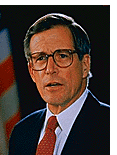 Has Obama overcome his foreign policy naiveté?
Has Obama overcome his foreign policy naiveté?
Commentary by Pete du Pont
March 29, 2013
Source: The Wall Street Journal
The domestic policies of the Obama administration evince a lack of understanding and experience in how an economy functions and grows. Things are not quite so clear with the administration’s foreign policies, where we see both encouraging and discouraging indications.
Those who think one of the federal government’s primary responsibilities is providing a strong national defense should be heartened by President Obama’s increased authorization of drone strikes against terrorists on foreign soil. Likewise the administration’s continued use of the Guantanamo Bay detention center and many of the Bush era security tools.
Unfortunately, there is much the president and his team get wrong on foreign policy. At times it seems that politics stand in the way of good policy. At least in the first term, the team suffers from an apparent naiveté in thinking the mere presence of Barack Obama in the Oval Office would make their “reset” with Russia productive or cause terrorists and the rogues leading Iran, North Korea and other troublesome countries to like the United States all of a sudden.
One of the administration’s most significant failings is its missile defense policy. It was 30 years ago last week that President Reagan spoke to the American people from the Oval Office and pushed the idea of a strategic defense initiative. SDI was derided by those on the left as “star wars” and considered fanciful by many of all political stripes due to the state of the available technology at that time.
Still, who could dispute Reagan’s goal—a world in which an intentional or accidental nuclear launch could end in something other than mutually assured destruction? Reagan said SDI would “offer a new hope for our children in the 21st century,” adding his basic duties as president included “the duty to protect and strengthen the peace.”
Critics were correct that the technology to develop, deploy and (most important) rely on such a system did not exist in 1983. There was much to do and many dollars to spend before something along these lines could be accomplished. But what a worthwhile effort it would be, and if pursued fully, it could have been this generation’s space program. Progress was made over the years, as technology was tested, refined and deployed. Sitting here in the 21st century, we are not yet able to fully deliver the “new hope for our children” of which Reagan spoke, but we do have functioning theater based systems.
Mr. Obama seems not to like the idea of missile defense very much. As national security writer Clifford May noted recently: “In 2001, Barack Obama, then a state senator, said flatly: ‘I don’t agree with a missile defense system.’ Seven years later, during his first presidential campaign, thensenator Obama pledged to slash $10 billion from the Pentagon’s missile defense budget—about $1 billion more than the U.S. was actually spending on missile defense at the time.”
Mr. Obama followed up during his first year in office by reneging on a promise to position missile defense systems in Poland and the Czech Republic. He has pushed for reductions in missile defense programs along with cuts in overall military spending. In spite of warning after warning about the other prong of our nuclear effort, our aging arsenal, this has not been a priority for the president either.
But the president just might have been mugged by the reality of North Korea’s belligerence and our frightening inability to know exactly how far along Pyongyang’s nuclear technology is. While the North Koreans appear to have the ability to reach Europe and parts of the U.S. now, we simply don’t know where they stand with their capability to arm their missiles with nuclear warheads. We know they continue to work on it.
The Pentagon recently announced it will finally bolster our antimissile capabilities by adding 14 new ground based interceptors to the 30 we already have in California and Alaska. As noted last week in The Wall Street Journal, those interceptors would already be in place if Obama had not previously stopped their deployment. Instead, these additional assets will not be deployed until 2017. Better late than never, but a lot can happen in North Korea in four years.
Could this be an omen of a broader shift in the Obama thinking, not just about missile defense, but also about our nuclear arsenal, the strength of our military overall, and the power of the president’s personality in changing the minds of despots and terrorists? Let’s hope so. In Reagan’s 1983 address is a statement that those who understand how the world works have known forever. It is a lesson our nation has learned, sometimes painfully and with loss of life. Unfortunately, it is something the Obama team has seemed not to understand: “We maintain the peace through our strength; weakness only invites aggression.”
0 Comments